The federal government is postponing the release of an action plan on missing and murdered Indigenous women and girls.
The plan was due to be made public on June 3, the one-year anniversary of the National Inquiry into Missing and Murdered Indigenous Women and Girls releasing its final report.
The $92 million federally-funded inquiry was tasked with examining the root causes of violence against Indigenous women and girls.
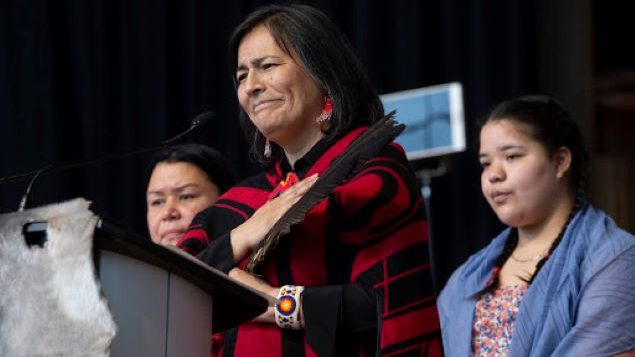
Commissioner Michele Audette speaks during ceremonies marking the release of the Missing and Murdered Indigenous Women report in Gatineau on June 3, 2019. (THE CANADIAN PRESS/Adrian Wyld)
In its final report, the commissioners concluded that decades of persistent and systemic racism and human-rights violations had contributed to the deaths and disappearances of hundreds of Indigenous women and girls and that it constituted a genocide.
The 1,200-page report included 231 “calls for justice” and in recent days Indigenous groups have pleaded with Ottawa to fast-track the action plan because they say the stress of the COVID-19 pandemic has resulted in an increase in violence against many Indigenous women and girls.
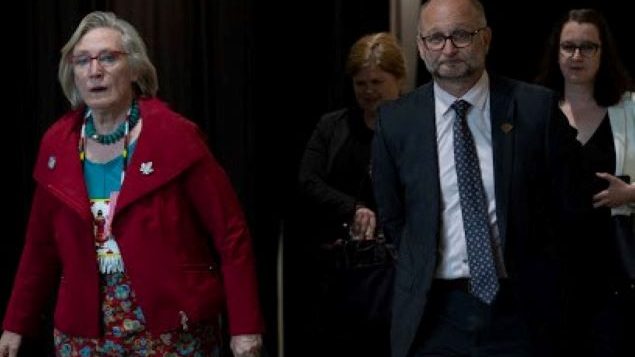
Crown-Indigenous Relations Minister Carolyn Bennett, left, and Minister of Justice and Attorney General of Canada David Lametti make their way to speak with the media following the release of the Missing and Murdered Indigenous Women report in Gatineau on June 3, 2019.
(THE CANADIAN PRESS/Adrian Wyld)
The commission’s recommendations for action addressed themes of health, justice, security and culture, including overcrowding and food insecurity for women in Indigenous communities, and more funding for women’s shelters.
A national action plan –with Ottawa working with provinces, territories, Indigenous leaders, families and women’s groups– was at the top of the list.
On Tuesday, Crown-Indigenous Relations Minister Carolyn Bennett said the COVID-19 pandemic has set back the government’s timeline and she could not say when a plan would be released.
“As hard as we are all working virtually, I think we will not have a plan in June,” Bennett told CBC News.
“We know it’s urgent. We are all impatient. But the kind of engagement that we’ve been able to do, I think, will deliver a quality plan.”
Bennett said more work and consultation are needed with Indigenous partners before a formal response to the report’s 231 recommendations can be finalized.
“We know it’s urgent and people are impatient but I think we also know that, and what we’ve been finding over these last months, it is often the same people on the front lines of COVID-19 who are on the front lines of keeping Indigenous women and girls and their families safe,” Bennett told The Canadian Press.
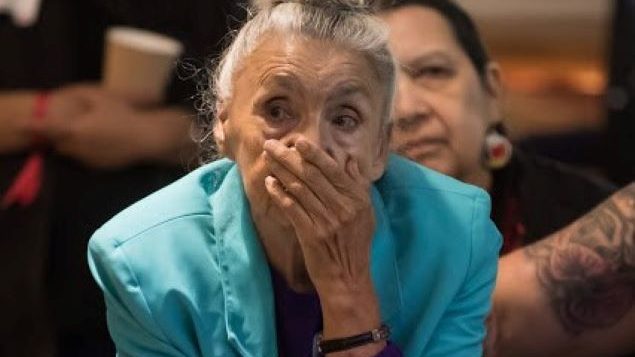
Indigenous elder Annie Johnston listens as Indigenous women and allies respond to the report on the National Inquiry into Missing and Murdered Indigenous Women and Girls, in Vancouver on June 3, 2019. (THE CANADIAN PRESS/Darryl Dyck)
The CBC’s Olivia Stefanovich reports that many–including for former chief commissioner Marion Buller–are unhappy with the delay.
“Using COVID-19 as an excuse for delaying a national action plan — to me — is really like saying, well, the dog ate my homework,” Buller said.
“So much could’ve been done, should’ve been done up to and including February and March.”
Buller said the federal government’s legislative moves to date are “small Band-Aids” and expects more.
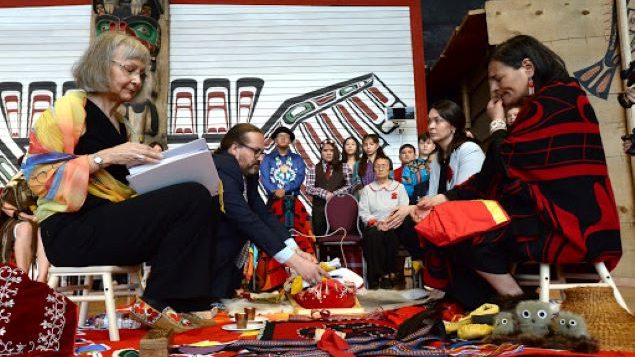
Left to right: Chief commissioner Marion Buller and commissioners Brian Eyolfson, Qajaq Robinson and Michele Audette prepare the final report to give to the government at the closing ceremony for the National Inquiry into Missing and Murdered Indigenous Women and Girls in Gatineau on June 3, 2019. (THE CANADIAN PRESS/Adrian Wyld)
Lorraine Whitman, president of the Native Women’s Association of Canada (NWAC), said she feels badly for the families of missing and murdered women and girls.
“They did open their hearts to all of Canada and that’s not easy to do, and we as a country need to stand by the families and let them know that we are here for them,” Whitman told CBC News.
From Manitoba, the CBC’s Sam Samson reports that some of those who testified during the National Inquiry, or worked for the commission, say they’ve heard “little to nothing” from different levels of government since the final report was published almost one year ago.
“The longer you see little to no action, it becomes very disheartening,” said Hilda Anderson-Pyrz, co-chair of the Manitoba MMIWG Coalition, who testified during the inquiry.
“You begin to wonder if this is just another report that’s going to be collecting dust on a shelf.”
With files from CBC News (Olivia Stefanovich, Sam Samson, John Paul Tasker), The Canadian Press
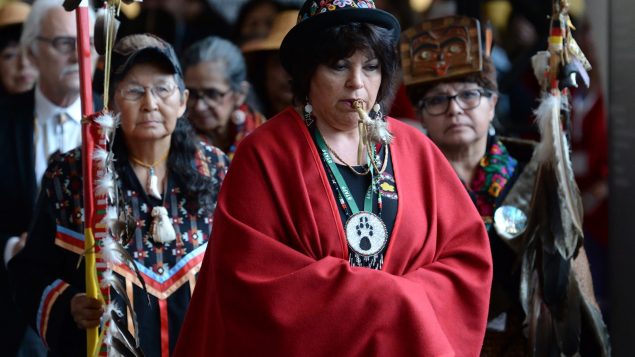






For reasons beyond our control, and for an undetermined period of time, our comment section is now closed. However, our social networks remain open to your contributions.